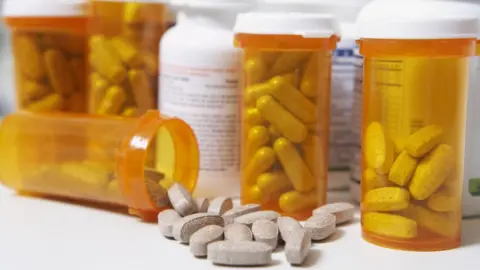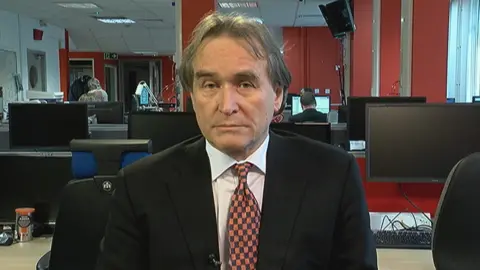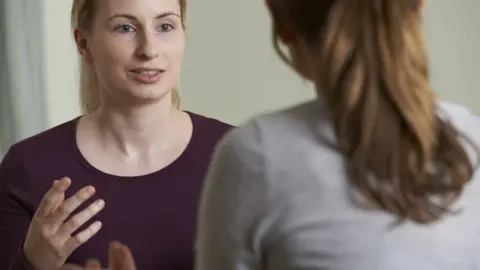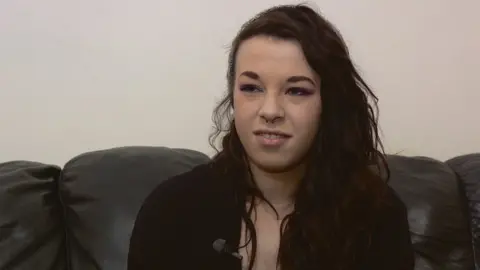Teenage antidepressants 'doing more harm than good'
 Thinkstock
ThinkstockA leading expert in psychiatric medication has said the growing prescription of antidepressants to teenagers is doing more harm than good.
Prof David Healy questioned why they were being given the medication when clinical trial results were so poor.
Last year, figures obtained by BBC Scotland showed more than 5,500 under-18s in Scotland were prescribed antidepressants.
The Royal College of Psychiatrists said the drugs were an important option.
They said medicines for mental health - just like for physical health - carried risk but guidelines were evidence-based.
Antidepressants were only prescribed to children with great caution and under close supervision, they said.
'Commonly used'
However, Prof Healy told a global health conference in Aberdeen that - in 29 paediatric clinical trials of antidepressants - every single one failed to produce an obvious benefit.
He said: "At the same time, in every single one of these trials it has produced more harms than benefits in the sense that it has made children become suicidal who wouldn't have become suicidal if they hadn't been put on these drugs."
Prof Healy said: "We have a situation where if you are following the evidence no-one should be using these drugs.
"At the same time, in teenagers, these drugs have become the most commonly used drugs."

Figures obtained by the BBC showed the number of children under 18 being prescribed antidepressants doubled from 2,748 in 2009/10 to 5,572 in 2016.
The number of children under 13 given antidepressants went up from 57 to 252 in the same period.
The Scottish government said the rise reflected the substantial increase in demand for child and adolescent mental health services in the past decade.
The statistics showed 45% of the under-18s were prescribed fluoxetine, which is usually sold under the trade name Prozac.
It is the only drug recommended for under 18s "as this is the only antidepressant for which clinical trial evidence shows the benefits outweigh the risks".
Even then it should not be prescribed until psychological therapy has been tried for three months and not worked.
 Getty Images
Getty ImagesProf Healy also questions the evidence base for fluoxetine, saying the two apparently favourable paediatric trials on the drug actually failed to show benefit on the main measurements, known in science as "primary outcomes".
He said there have been a further seven paediatric trials since its licence was issued and fluoxetine has failed to show benefit in any of these.
'Absolutely astonished'
Dr Jane Morris, from the Royal College of Psychiatrists, said adolescents should definitely have the option of antidepressants alongside therapy and counselling.
She said: "I think they should be particularly carefully selected medications and I think they should be prescribed not only for cases of depression but perhaps even more when a person has extreme anxiety and obsessionality, because there is a very good evidence base for that."
Dr Morris, a consultant psychiatrist at Aberdeen's Royal Cornhill Hospital, said she was "absolutely astonished" by the way Prof Healy had interpreted the literature on antidepressants.
She said there were many studies that demonstrated antidepressant drugs can be the most effective treatment for young people with depressive disorders.
But she said it was important to see whether the benefits of the medication outweighed the risks.
Dr Morris said people should not alarmed by the rise in the number of people accessing treatment.
"We should regard that in fact as part of the catch-up period that some people with these incredibly distressing, and ultimately life-threatening disorders, are now getting the help that they need," she said.

'It was a traumatic experience'

Amiee Folan from Glasgow had a troubled childhood and was diagnosed as bipolar when she was 12.
At the age of 16, when she was staying at a children's unit in Scotstounhill, she went to see her GP and was prescribed antidepressants that had a devastating effect - within a week she had attempted suicide.
She told BBC Scotland: "I went there to ask for help, counselling or something with a therapist, but they prescribed antidepressants and sent me on my way after a 10-minute appointment."
Amiee says the doctor warned that the drugs could make her feel "low" for a few days.
"They didn't say I would get to the point where I was hearing voices and seeing people who were not there," she says.
Amiee says she had night terrors and voices in her head telling her to hurt herself and her partner, symptoms she had never experienced before.
"It was quite a traumatic experience," she says.
She became so desperate she attempted suicide.
Aimee, who is now 20, says antidepressants should only be given after a therapist has assessed a person's symptoms and decided the drug and dosage that would be suitable.
"Other than that I don't think they are really needed under the age of 18," she adds.
"I thought it was quite scary that I could just walk in and say 'I'm depressed' and basically they just handed them to me."

Most-studied medicines
The umbrella body for drug companies, the Association of the British Pharmaceutical Industry (ABPI), said there were limited treatment options for children and young people with depression.
Sunayana Shah, head of regulatory and safety policy at the ABPI, said: "Any decision to prescribe antidepressant medicines is one made between a clinician and a patient or their guardian before a drug is prescribed and while treatment is ongoing."
Ms Shah said SSRI antidepressants were "one of the most studied classes of medicines" and they are reviewed on an ongoing basis.
"However, if substantial new information on side effects or effectiveness becomes available, it will be rigorously reviewed by the medicines regulators to assess whether the treatment is still suitable," she said.
It is recommended that you do not stop taking any medication before consulting with a doctor.
The BBC Action Line site has information on organisations that can provide information and support: http://www.bbc.co.uk/actionline
